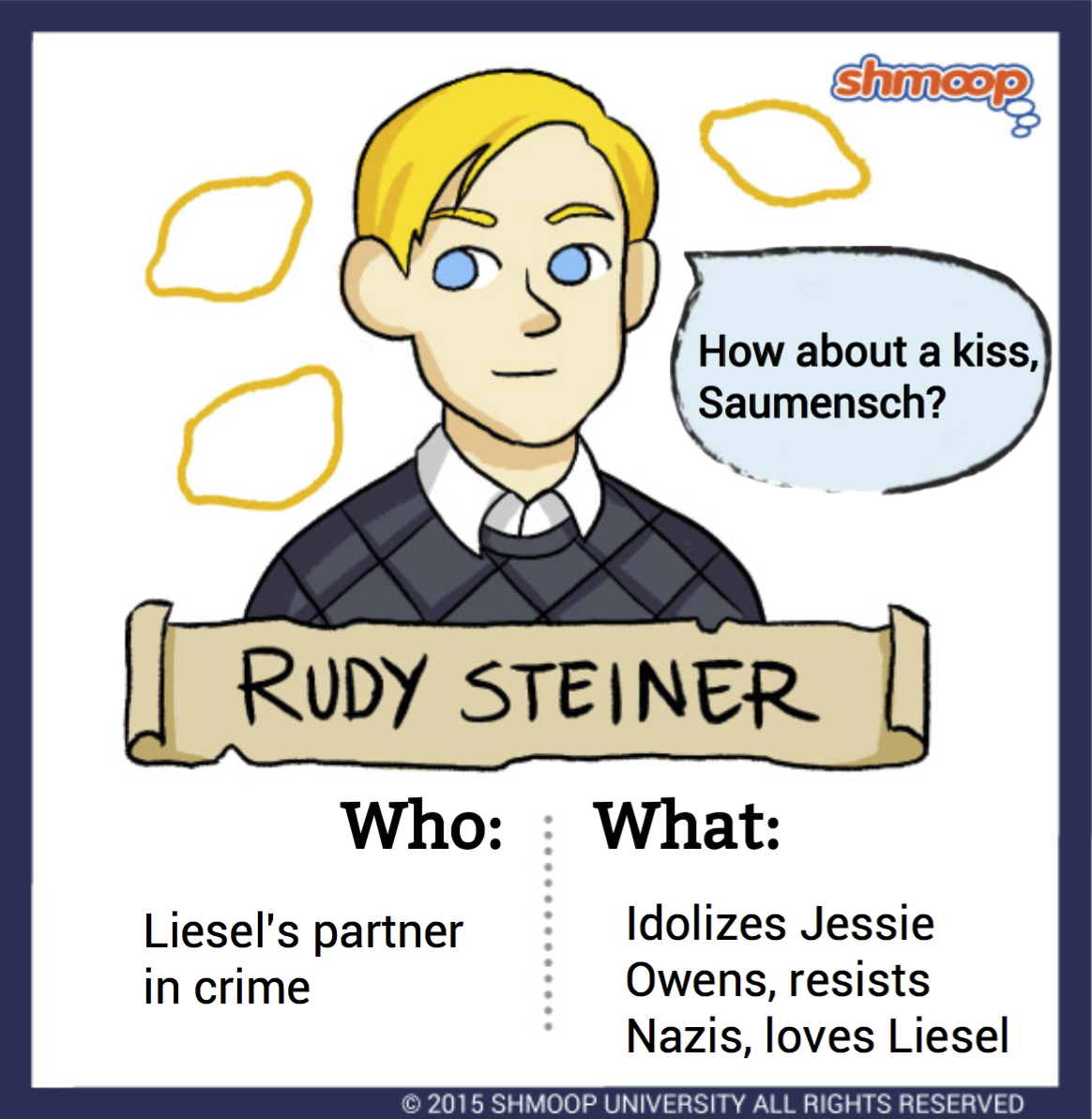Character Analysis

(Click the character infographic to download.)
The Sweetest Lemonhead
Rudy is Liesel's lemon/sunshine-haired sidekick. He's the Saukerl (pig boy) to her Saumensch (pig girl)... as they affectionately refer to each other. (Ugh. We thought our childhood nicknames were bad.)
He starts off in the novel as a ten-year-old boy with "bony legs, sharp teeth, gangly blue eyes, and hair the color of a lemon" (8.21). Bony legs aside, Rudy wants to be a star runner, like Jessie Owens. Owens, a black American man, won four gold medals in the 1936 Olympic Games, held in Munich, Germany.
Needless to say, Hitler was not pleased. Jessie Owens was trampling on his theories of white supremacy.
Seven-year-old Rudy admired Owens so much that he painted himself with charcoal and tried to reenact the race in downtown Molching. Blackface aside, we know immediately that Rudy probably won't grow up to be a Nazi. Notice how the novel stresses Rudy's appearance. Physically, he is the picture of the Nazi ideal. Mentally, he is the opposite. Jessie Owens is included in Rudy's vision of the ideal. Rudy identifies with Owens because of the shared love of athletics, which cuts across racial, ethnic, and religious lines, and other lines of difference. For Rudy, difference is not something to be feared or eradicated.
Rudy's Growth
Before his death at fourteen, Rudy has met his goal. Not only has he become a really smart kid, but he's also great athlete. He's grown as a result of his efforts to balance staying alive and resisting the injustices he sees around him. A horrible lesson is learned when this resistance wavers, and ego takes over. To show off to his new Hitler Youth leaders and to show everybody that he's becoming a success, he wins too many races at the Hitler Youth carnival.
As a result, he draws the attention of the Nazis, who are recruiting the best and the brightest for a special school. Rudy's parents are horrified and have to make a terrible bargain. Rudy's father Alex is conscripted into the military in exchange for Rudy staying in Molching, on Himmel Street. Of course, these things aren't really Rudy's fault. Like the other characters, he's walking on eggshells. One wrong move could mean his death... or the death of another.
But, before his death, he's stepped up his resistance activities. Following the example of Hans Hubermann, Rudy takes bread to give to the Jewish prisoners marching to Dachau. He leaves the food on the ground in the hopes that much of it can be eaten before it's detected by the Nazi guards. Now he's not showing off—he's just trying to do a little good.
Rudy exercises similar judgment when he uses all his strength to stop Liesel from following Max after she and Max have been whipped. He probably saves her life, and Max's as well. We see him becoming more serious and more thoughtful. We see his intelligence blooming, as he processes his world through sharp and kind eyes. His death is one of the most painful aspects of the novel for the readers, for Liesel, and perhaps especially for his father, who returns to Himmel Street to find his entire family dead.
Rudy And Liesel
Rudy, "the boy who refuses to fear the opposite sex" (8.23), loves Liesel from the moment he meets her. His love grows and grows right up to the bitter end. We're talking both friendly love and romantic love, in Rudy's case. This is a boy who's not afraid to ask for a kiss. Until, that is, the day he rescues The Whistler from the Amper River. On that day, Liesel's refusals are too much to bear, and he stops asking.
We know Liesel loves Rudy as a best friend. We know that after she's whipped on the street along with Max, she wants Rudy to kiss her. But this desire might have been born from all sorts of conflicting emotions. Romantic interest was surely one of them, but not necessarily as romantic as his love for her. Her feelings for him are never precisely revealed.
Why? Because Rudy dies before she can find out. Liesel is just fourteen when Rudy dies. Rudy is fourteen, too, but seems much more sure of his feelings in that area. We have a hard time imagining him falling out of love with Liesel at any point, but that might just be because he'll be forever fourteen in our eyes.
We are also told that after Rudy's death, Liesel enters the Amper River with all her clothes on. She's heard talking about a kiss and saying the word "Saumensch" (86.34). "How about a kiss, Saumensch," (45.41) are the words Rudy said to her that day he rescued her book from the Amper River. The day he stopped asking. Liesel's moment in the river and her kissing Rudy's lips when he's dead definitely suggest that she regrets not kissing him.
Rudy Steiner's Timeline